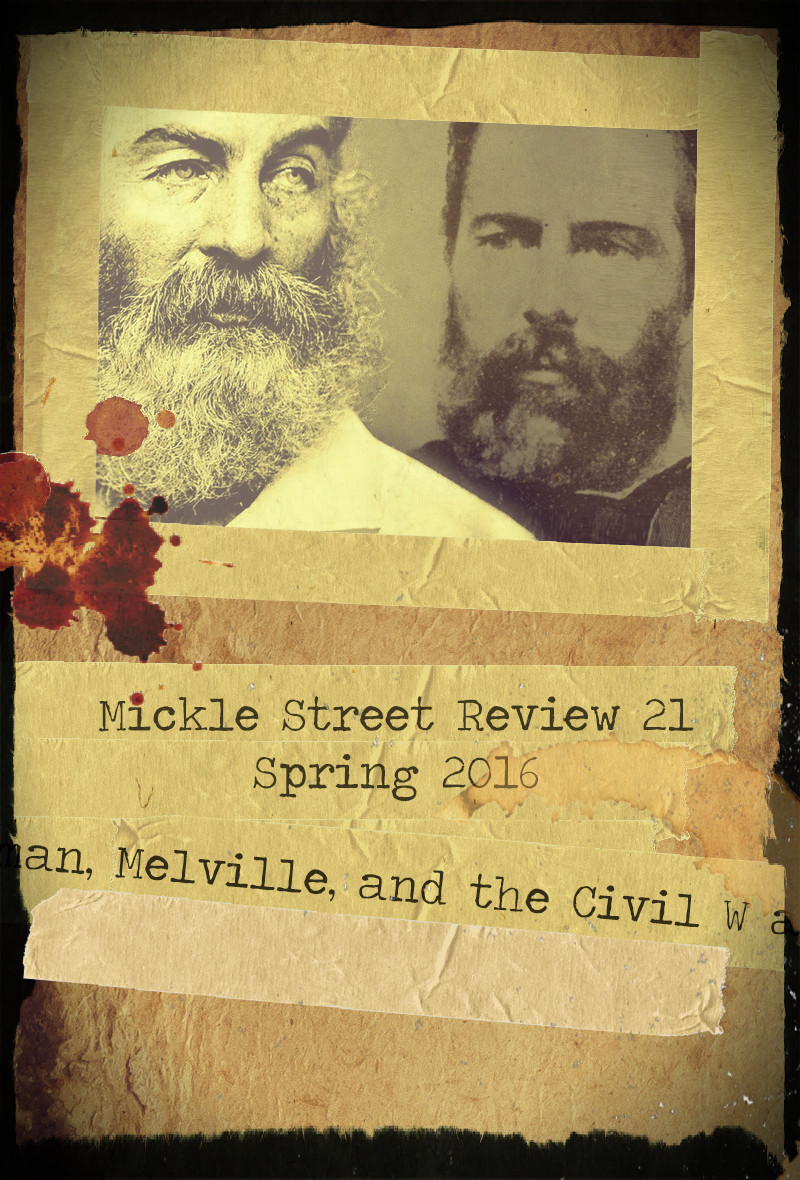From the Archive
Issue 21
Whitman, Melville
& the Civil War
2016

“I feel at last, & for the first time without any demur, that I am satisfied with it—content to have it go to the world verbatim & punctuation. It is in my opinion superior to Leaves of Grass—certainly more perfect as a work of art, being adjusted in all its proportions, & its passion having the indispensable merit that though to the ordinary reader let loose with wildest abandon, the true artist can see it is yet under control.” –Walt Whitman, on Drum-Taps
“Were I fastidiously anxious for the symmetry of this book, it would close with the notes. But the times are such that patriotism—not free from solicitude—urges a claim overriding all literary scruples.” –Herman Melville, on Battle Pieces
Introduction
Welcome to the Civil War issue of Mickle Street Review, timed to coincide with the sesquicentennial of Walt Whitman’s book, Drum-Taps (first published in 1865 and reissued with a sequel later that year and dated “1855-56”) and Herman Melville’s book of war verse, Battle Pieces (1866).
Neither Drum-Taps nor Battle Pieces was embraced when it first appeared. Critics complained about just how dissonant the poems sounded, how poorly the poems seemed to perform. Whitman’s Civil War poetry soon outran those early negative reviews (by the likes of Henry James), but it took Melville’s poems much longer (within perhaps the last twenty or so years) to be regarded as significant representations of the war and its politics.
Both men were on the Union side and both had access to the war not as soldiers but in more oblique ways. Whitman visited a battlefield in search of his wounded brother, George, and served as a nurse in Army hospitals in Washington, DC; Melville read about the fighting in magazines and newspapers and also traveled to battlefields.
In the essays included in this issue (some of which are primarily about Melville, some mostly about Whitman, and some equally about both), writers take up the Civil War poetry of these two major American authors, and work to see that poetry in cultural context and as the canny rhetorical performances that they are.
The other sections of this issue seek to highlight the ways in which the Civil War Whitman and the Civil War Melville (perhaps more so the Civil War Whitman) have figured in a range of media over the past 150 years. On stage, on the page(s of fiction), on film, in music and in the visual arts, Whitman and Melville’s Civil War poetry has provided a rich textual ground. Their war art has been variously redeployed, interpreted, and reimagined to speak to other times and places, including other wars across the twentieth century.
In addition, the historical war-time figure of Whitman in particular has served as a subject for future poets (those so-called “poets to come”) who meditate on his care of wounded soldiers during the war and the profound influence of the war and its lessons on Whitman, who claimed in 1871 that “my Book [Leaves of Grass] and the War are one.”
— Tyler Hoffman, Editor
Table of Contents
A Cluster of Essays
on Melville, Whitman, and the Civil War
Published by MSR:
- Shadows in the Shenandoah:
Melville, Slavery, and the Elegiac Landscape
Tom Nurmi - Battle-Pieces and Vernacular Poetics
Timothy Sweet - Reconciliation as Sequel and Supplement:
Drum-Taps and Battle-Pieces
Peter J. Bellis - Embodying the Book:
Mourning for the Masses in Walt Whitman’s Drum-Taps
Adam C. Bradford - The Battle of Fredericksburg Revised:
Whitman’s and Melville’s Poems in Draft and Final Form
Cynthia Wachtell
Curated Links:
- On Historical Art: Melville and the Poetry of the Civil War
by Frederick Turner at the Newington-Cropsey Cultural Studies Center. - How the Civil War Transformed American Literature
by Randall Fuller at Humanities Texas
Issue Credits
Mickle Street Review is sponsored and published by the Department of English
at the Camden campus of Rutgers, The State University of New Jersey.
EDITOR
Tyler Hoffman, Rutgers University-Camden
ASSOCIATE EDITOR
Michael Russo, Rutgers University-Camden
CONTRIBUTING EDITOR
Christopher Sten, George Washington University
Site Design by Michael Russo
Wallpaper by Robert Shenk
Mickle Street Review would like to thank Johns Hopkins University Press for permission to re-publish essays by Tom Nurmi, Timothy Sweet, and Peter J. Bellis. Leviathan is the original place of publication. 2015 JHUP and The Mellville Society. | CLICK HERE FOR MORE.

Copyright | Rutgers University – Camden.
Supported in part by a grant from the
Gilder Lehrman Institute of American History.
